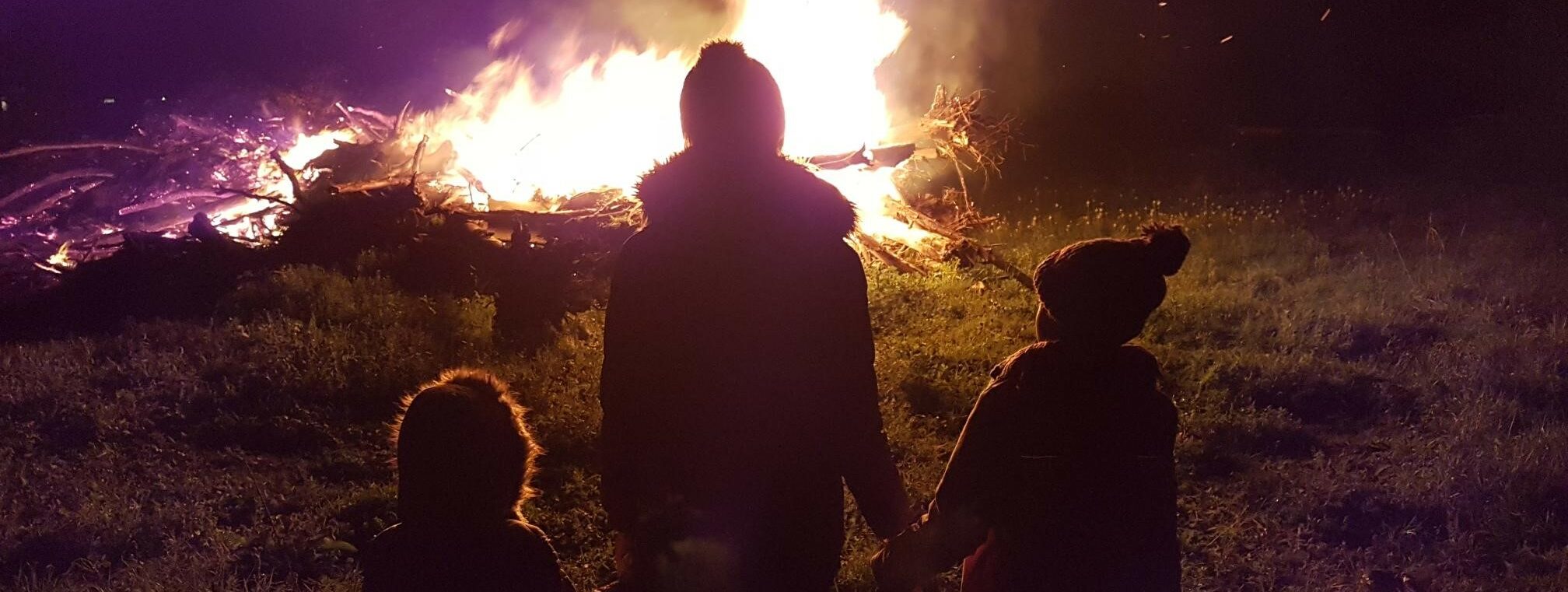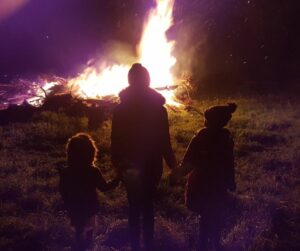
26 Apr 2022
Nancy’s blood cancer story
Nancy* was 33 and seven months pregnant with her second daughter when she was diagnosed with multiple myeloma. Seven years on, she describes how her family, specialist counselling and faith gave her strength to face up to cancer.
Nancy’s Story
Receiving a multiple myeloma diagnosis was devastating. The life that I lived ended on that day. I didn’t comprehend the limitations, the trauma, the stress, the anxiety, or the loss that would come as a result of being diagnosed.
I was fit and healthy, I didn’t smoke, I didn’t drink alcohol excessively or take drugs. If I could have attributed the disease to something tangible then I think I would have been able to reconcile the diagnosis a bit more, but I couldn’t.
I’d never heard of multiple myeloma. I was assured it is not terminal, but what has been difficult to come to terms with and live with is the fact it is an incurable cancer. It can be treated, and it can be managed, but to date there is no cure.
Pregnancy, Myeloma, and chemotherapy
My daughters gave me motivation to want to live and to undergo treatment, but it came with immense sadness because throughout my journey, my thoughts were, I don’t want to die yet, and I don’t want to leave my children at such a young age because they won’t remember me.
I don’t think my doctors had treated anyone with this disease who was pregnant before. My daughter was born prematurely by planned C-section. I spent my maternity leave having chemotherapy and my first autograft stem cell transplant, when she was 10 months old. Sometimes I’d bring my daughter to my chemotherapy sessions and feed her in the nurses’ room. They all got to know her.
Over five years I had more than 20 rounds of chemotherapy, two autograft and one allograft stem cell transplants, with my sister as my donor. With every round of chemotherapy and every transplant I’ve had I lost my hair, my confidence, and weight. Losing all of those things caused a huge crater in my sense of self.
Caring for body and mind
I have heavily relied on the counselling service at King’s College Hospital in London. I met Philip Alexander, a Haemato-oncology psychotherapist, when I was in hospital having my first transplant. That was in 2013 and I still engage with him today.
When I met Philip, I was at my most vulnerable. I didn’t always find it easy to turn to family and friends, because of how close they are. I worried about how they were feeling and their reaction at seeing me weak and slowly disintegrate. It was an especially difficult time for my mum.
I relied on my amazing family, wonderful friends, church community and counselling to provided me with different forms of psychological and emotional support. Tapping into them whenever I felt sad or needed reassuring.
I feel blood cancer is a hidden but disability. Throughout my treatment, even though I had lost a lot of weight and was undergoing gruelling treatment, I never looked very ill. This meant it was difficult for some family, friends, and colleagues to understand the severity of my condition. Counselling really helped me navigate this.
My life in remission
Without Philip’s counselling it would have taken me longer to achieve a sense of perspective and to think positively about the future. Counselling has given me an alternative way of thinking and in a strange way, it normalised an abnormal situation.
I am not just a person with myeloma, I am a mother, a sister, a daughter and a friend. Counselling helped me piece these ‘roles’ together, so that multiple myeloma did not define and take over my being.
Once I felt I had come through the worst of it, I wanted to concentrate on living, giving something back and raising as much awareness as possible of blood cancer. So in 2017 I organised a charity fundraising ball in aid of Myeloma UK, I attended for the first time the 10th anniversary of the African Caribbean leukaemia trust (ACLT) fundraiser, which was amazing as I met other black women who also had stem cell replacement transplants and could appreciate the intricacies of going through the process from a black woman’s perspective. I was also honoured to speak at the ‘Leaders in Leukaemia’ conference in 2019 to give my view of the emotional and well-being care I had and continue to receive as a haematology patient at King’s College hospital.
In 2020 I completed a Postgraduate Higher Certificate in Humanistic and Psychodynamic counselling and the year before celebrated my 40th birthday. I threw a big party for my family and friends, I was so happy to be alive and to this day it is one of my fondest recent memories.
Life during COVID-19
Just before the coronavirus pandemic changed our world, I felt I finally had regained more autonomy and control in my life. Then we went into lockdown, which brought back memories from my diagnosis treatment and hospitalisation. Once again, I had to relinquish a lot of my independence to keep myself safe. That was difficult as I felt it was another point in my life when time was being taken away from me.
Shielding reminded me of the fragility of my health, especially as my employer is sensitive to my condition, highlighting some of my insecurities and once again making me face the reality of my situation. I was very fortunate that my employer is understanding and accommodated me working from home.
As much as possible, whilst shielding I tried to strike a balance in my life, to overcome the social anxieties I felt at the time whilst following social distancing guidelines. I went out with my two daughters and created a bubble so that we had opportunities to see family and friends.
Something I found interesting about lockdown is how it has made more people appreciate the simple things in life. Following my diagnosis, I felt that I had already gone through that process and had been making sure to spend time with family and friends.
Despite those difficult times, I had happy moments more often than not, whilst adjusting to an alternative way of life.

My tips for anyone affected by a blood cancer
When asked by Leukaemia UK to share my tips to help support others affected by a blood cancer, I immediately thought of sharing the tips I am drawn to:
Honesty. I recommend being honest with yourself about what you can, can’t and won’t and will do.
Ask for help. Even if it’s hard to admit to yourself that you need help. My diagnosis has made me realise the importance of this.
Recoup your energy. It’s OK to have times when you want to be by yourself or rest. I can’t give anything to anyone if I don’t have the energy to do it. Sometimes I ‘check out’, dedicating a little time to myself. Resting enables me to digest where I am so I can recoup my energy.
*Name has been changed.
Leukaemia UK funded the first service of its kind to offer dedicated counsellor and clinical psychologist support for haematological patients like Nancy at King’s College Hospital in London. Through the Leukaemia UK Mind & Body Team, people affected by blood cancer will routinely receive psychological support where needed. It is hoped that by making emotional support an integral part of everyone’s treatment, psychological problems may be identified early or even avoided altogether.
Related posts
11 August 2021
Dr Samanta Mariani recognised for her innovative research through Leukaemia UK John Goldman Fellowship and Olive Boles Innovation Award
We are delighted to announce the Leukaemia UK John Goldman Fellowship and Olive Boles Innovation Award has been awarded to Dr Samanta Mariani, in recognition of her innovative research that could contribute significantly to our understanding of leukaemia and other blood cancers.
11 February 2022
International Childhood Cancer Day: Dr Samanta Mariani reflects on her research into infant leukaemia
On International Childhood Cancer Day, Dr Samanta Mariani reflects on her research into infant leukaemia, what drives her in her work and her hopes for the future.
12 December 2022
Widespread coverage of new leukaemia therapy shows promise in first trial patient
As you may have seen in the news over the weekend, a clinical trial investigating a new leukaemia treatment has shown promising results. As part of the trial, funded by…
25 June 2019
Championing groundbreaking therapies and emotional support
We are proud to be at the forefront of funding innovative research into gene therapy treatments